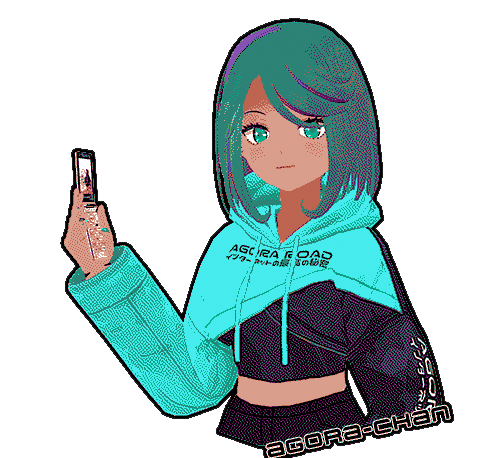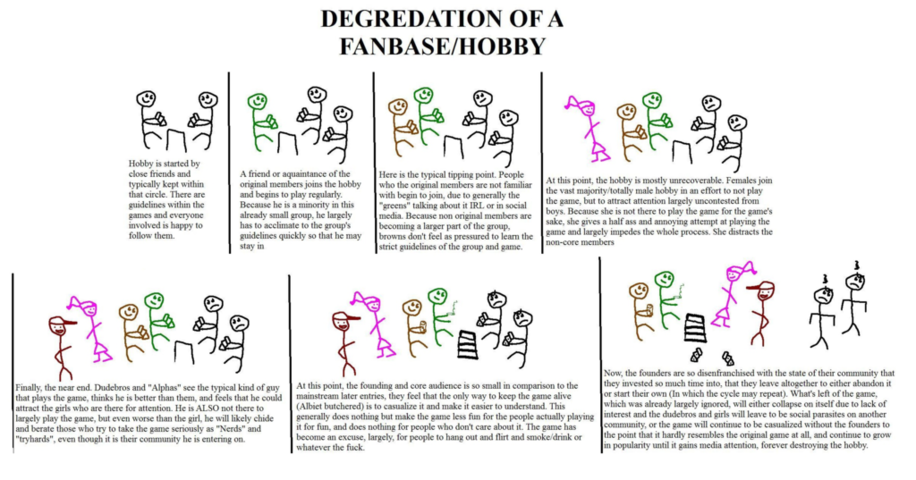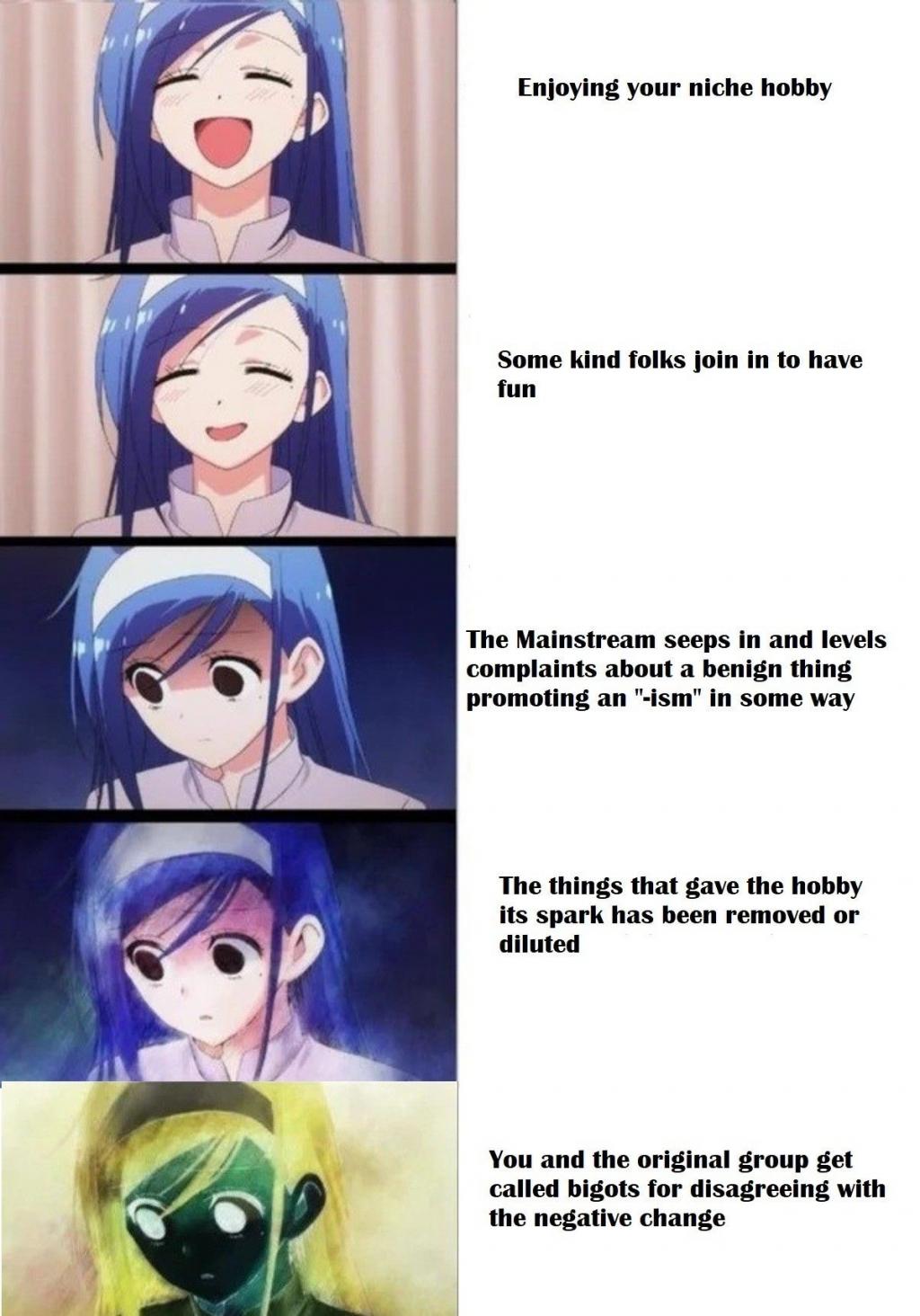Orlando Smooth
Well-Known Traveler
- Joined
- Aug 12, 2019
- Messages
- 459
- Reaction score
- 1,732
- Awards
- 145
I recently had some mindless work to do, so I listened to this video someone had sent me regarding the rise and fall of geek culture. If you're not familiar with the creator, she's a Canadian progressive who makes these long videos about cultural topics - a style that the YT algorithm currently loves. With that being said, the content wasn't as bad as I expected, likely due to the fact that she has a background in formalized debate. For instance, she makes it all the way to the 56th minute before saying capitalism, 67 minutes before mentioning men in a negative way (shortly followed by claims of racism), and a full 70 minutes before mentioning gamergate. Still, the content rang fairly hollow to me. The crux of the argument is essentially "2000's-2010's geek culture was primarily white men, white men are toxic, therefore it was bad and failed." While some of the points made were entirely valid, they do not add up to support the overall claim of "everything I don't like is toxic masculinity." For example neckbeards truly were/are shitty people, but their toxicity towards you does not inherently represent a unique hatred towards your demographic. Funko Pops are dumb pieces of plastic that people should not feel pride in owning, but that speaks more to the stupidity of the average person than a valid criticism of capitalism.
________________________________________
So this had me thinking; since I'm unsatisfied with this explanation of the downfall of geek culture, what is my explanation?
Background on me: I'm not looking to dox myself, but I was born in the early/mid-90's America in a town where, if you were to randomly take someone I went to high school with, you'd have roughly equal probabilities of picking someone who became a doctor/lawyer/etc. and someone who became an alcoholic day laborer. I was the smart, awkward, nerdy kid in school, so I was around to happily watch as the things that I enjoyed as a kid gained popularity as the mainstream picked up geek shit to the extent it did starting in the late 2000's. As I approached and entered my 20's though, I found that I no longer had the attachment to these things in the way that I once did. My life was occupied with new situations and new forms of meaning and fulfillment - put simply, I grew up. This meant that I was able to watch with unattached amusement as the whole scene fell apart later in the 2010's. I understood the infighting and was a witness to it on the various socials, but rarely if ever engaged as I was far more likely to laugh at both sides of the flame war for how emotional they would get over IP.
Yeah, yeah, get to the point: One of the good points made in the video was that at a certain time it stopped being about actually being a fan of something and was more about being part of the fandom monoculture itself. For a lot of people, this was their primary source of community and acceptance where they would convene to discuss their ideas, seek support, express their loyalties through various signaling devices, attempt to find meaning, and argue others who held opposing views... sound familiar? Basically, it is my opinion that nerd pop culture was the last stop on the secularization path that has railroaded society's normies from religion to culture war over the past ~50 years or so. These people tried to fill a god-shaped hole with graphic tees and funkos, failed to do so, and thus moved on to the next thing to fill that hole which turned out to be the culture war. Think about it, how many of the people that you knew who were super into the fandom scene are now either SJWs or incels? The pipeline of tumblr and 4chan to political extremism was definitely a real phenomenon by the mid/late 2010's.
If religion truly is the opiate of the masses, perhaps it's best to keep them on a slow drip instead of ODing or flushing the stash.
________________________________________
So this had me thinking; since I'm unsatisfied with this explanation of the downfall of geek culture, what is my explanation?
Background on me: I'm not looking to dox myself, but I was born in the early/mid-90's America in a town where, if you were to randomly take someone I went to high school with, you'd have roughly equal probabilities of picking someone who became a doctor/lawyer/etc. and someone who became an alcoholic day laborer. I was the smart, awkward, nerdy kid in school, so I was around to happily watch as the things that I enjoyed as a kid gained popularity as the mainstream picked up geek shit to the extent it did starting in the late 2000's. As I approached and entered my 20's though, I found that I no longer had the attachment to these things in the way that I once did. My life was occupied with new situations and new forms of meaning and fulfillment - put simply, I grew up. This meant that I was able to watch with unattached amusement as the whole scene fell apart later in the 2010's. I understood the infighting and was a witness to it on the various socials, but rarely if ever engaged as I was far more likely to laugh at both sides of the flame war for how emotional they would get over IP.
Yeah, yeah, get to the point: One of the good points made in the video was that at a certain time it stopped being about actually being a fan of something and was more about being part of the fandom monoculture itself. For a lot of people, this was their primary source of community and acceptance where they would convene to discuss their ideas, seek support, express their loyalties through various signaling devices, attempt to find meaning, and argue others who held opposing views... sound familiar? Basically, it is my opinion that nerd pop culture was the last stop on the secularization path that has railroaded society's normies from religion to culture war over the past ~50 years or so. These people tried to fill a god-shaped hole with graphic tees and funkos, failed to do so, and thus moved on to the next thing to fill that hole which turned out to be the culture war. Think about it, how many of the people that you knew who were super into the fandom scene are now either SJWs or incels? The pipeline of tumblr and 4chan to political extremism was definitely a real phenomenon by the mid/late 2010's.
If religion truly is the opiate of the masses, perhaps it's best to keep them on a slow drip instead of ODing or flushing the stash.












